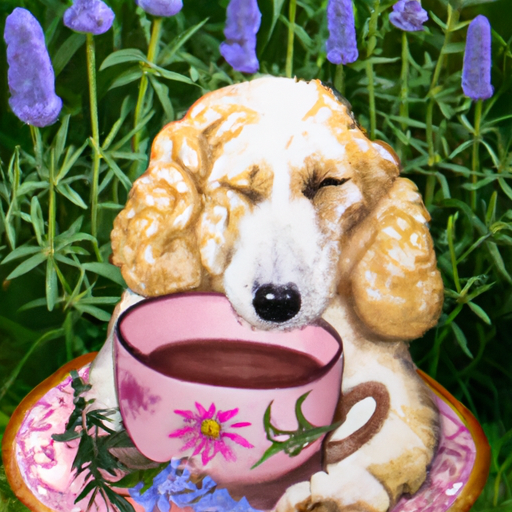Just as the saying goes, “A cup of tea makes everything better.” However, when it comes to our furry companions, we must be careful about what we offer them. While herbal tea is beloved by many for its health benefits, can dogs also partake in a sip? This article delves into the question of how much herbal tea is safe for dogs to consume.
Herbal tea is a beverage made from the infusion of various plant materials, such as leaves, flowers, and roots. It is often praised for its antioxidant properties and potential positive effects on digestion and anxiety. However, before you pour a cup for your canine companion, it’s important to understand the potential risks involved.
While herbal tea can be safe for dogs in moderation, not all herbal teas are suitable for them. Some herbs can be toxic to dogs and may lead to adverse reactions such as vomiting, diarrhea, or even damage to vital organs. Therefore, it is crucial to consult your veterinarian before introducing herbal tea into your dog’s diet.
In the following sections, we will discuss safe herbal teas for dogs and the recommended amounts they can consume. We will also delve into the signs of herbal tea toxicity in dogs, allowing you to enjoy a cuppa responsibly with your four-legged friend.
Key Takeaways
- Herbal tea can be safe for dogs in moderation, but it is important to consult a veterinarian before giving it to them.
- Not all herbal teas are suitable for dogs, as some herbs can be toxic and cause adverse reactions.
- The appropriate dosage of herbal tea for dogs should be determined by a veterinarian, as each dog may have a different reaction.
- Signs of herbal tea toxicity in dogs include vomiting, diarrhea, increased heart rate, tremors, and seizures. If these symptoms occur, contact a veterinarian immediately.
Understanding Herbal Tea and Its Benefits for Humans
You can enjoy a warm cup of herbal tea on a cozy evening, feeling its soothing benefits as you sip it slowly, allowing the fragrant steam to envelop your senses.
Herbal teas have been consumed for centuries due to their various health benefits. These teas are made from the leaves, flowers, seeds, or roots of different plants, providing a range of flavors and medicinal properties.
The health benefits of herbal tea are numerous, as they can aid in digestion, boost the immune system, and promote relaxation. Some popular herbal tea varieties include chamomile, peppermint, ginger, and lavender.
Chamomile tea, for example, is known for its calming properties, making it a great choice for reducing anxiety and improving sleep quality. Peppermint tea can help with digestive issues, while ginger tea is often used to alleviate nausea and inflammation. Lavender tea is renowned for its relaxation effects and can help reduce stress and promote better sleep.
These herbal teas offer a natural and therapeutic way to support overall well-being. However, it’s important to be aware of the potential risks of herbal tea for dogs, as their bodies may react differently to certain ingredients.
The Potential Risks of Herbal Tea for Dogs
Imagine the potential dangers that may arise when your furry companion indulges in a steaming cup of nature’s infusion. While herbal tea can provide numerous benefits for humans, it is important to understand that it may not have the same positive effects on our four-legged friends. In fact, herbal tea can pose potential risks to dogs and should be approached with caution.
To help illustrate the potential dangers of herbal tea for dogs, let’s consider a comparison table:
| Potential Dangers of Herbal Tea for Dogs | Alternative Options |
|---|---|
| Contains caffeine and other stimulants | Offer plain water |
| May contain toxic herbs or additives | Provide dog-friendly herbal alternatives, such as chamomile or ginger |
| Can cause digestive upset or diarrhea | Stick to a balanced diet and regular pet food |
As shown in the table, herbal tea can contain caffeine and other stimulants that can be harmful to dogs. Additionally, some herbal teas may include toxic herbs or additives that can be toxic to our canine companions. Consumption of herbal tea can also lead to digestive upset or diarrhea in dogs.
Considering these potential risks, it is crucial to consult your veterinarian before sharing herbal tea with your dog. By doing so, you can ensure the safety and well-being of your furry friend. Transitioning into the subsequent section, it is essential to seek professional advice to determine if herbal tea is suitable for your dog’s unique needs.
Consult Your Veterinarian before Sharing Herbal Tea with Your Dog
Before sharing herbal tea with your furry friend, it’s crucial to consult your veterinarian to ensure their safety and well-being. While herbal tea may have potential health benefits for dogs, it is important to understand that each dog may have a different reaction to herbal teas. Some dogs may tolerate herbal tea well, while others may experience adverse effects. Consulting with your veterinarian will help determine if herbal tea is suitable for your dog and if there are any specific precautions or considerations to keep in mind.
The potential health benefits of herbal tea for dogs can vary depending on the type of tea and the specific needs of your dog. Certain herbal teas, such as chamomile or ginger tea, may have calming properties that can help soothe an upset stomach or reduce anxiety in dogs. Other herbal teas, like green tea, may contain antioxidants that can support the immune system and promote overall well-being. However, it is important to note that these potential benefits are not guaranteed, and the effects may vary from dog to dog.
Transitioning into the subsequent section about ‘safe herbal teas for dogs,’ it is important to explore the different options available and their specific benefits for our furry companions.
Safe Herbal Teas for Dogs
Indulge your furry friend with a delightful cup of herbal goodness that’ll leave them wagging their tail in pure bliss. When it comes to finding dog-friendly herbal tea options, there are a few alternatives that are safe and enjoyable for our four-legged companions.
One popular choice is chamomile tea, which has calming properties that can help with anxiety and digestive issues in dogs. Another option is peppermint tea, which can aid in soothing an upset stomach and freshening their breath. Additionally, ginger tea can be beneficial for dogs with nausea or motion sickness.
However, it’s important to note that not all herbal teas are safe for dogs. Avoid teas that contain ingredients like caffeine, artificial sweeteners, or any herbs that are toxic to dogs, such as aloe vera or eucalyptus.
Moderation is key when it comes to giving herbal tea to dogs. While a small amount of herbal tea can be beneficial, too much can lead to digestive upset or other health issues. It’s always best to consult with your veterinarian before introducing any new food or drink into your dog’s diet.
Transitioning into the subsequent section about ‘moderation is key: how much herbal tea can dogs have?’, it’s important to understand the appropriate serving size for our furry friends.
Moderation is Key: How Much Herbal Tea Can Dogs Have?
To ensure your canine companion stays happy and healthy, it’s essential to understand the appropriate amount of herbal tea they can enjoy. While herbal tea can offer certain health benefits for dogs, it is important to remember that moderation is key. Giving your dog too much herbal tea can lead to potential health issues.
When it comes to herbal tea dosage for dogs, it is recommended to consult with a veterinarian. They can provide guidance based on your dog’s specific needs and health condition. As a general guideline, it is best to start with small amounts and monitor your dog’s reaction. If there are no adverse effects, you can gradually increase the dosage, always keeping an eye on their well-being.
To emphasize the importance of moderation, here is a table showcasing examples of herbal tea alternatives for dogs:
| Herbal Tea Alternatives for Dogs |
|---|
| Chamomile |
| Peppermint |
| Rooibos |
| Dandelion |
| Ginger |
Remember, these alternatives should be given in appropriate amounts and only under the guidance of a veterinarian.
Understanding the appropriate dosage and alternatives for herbal tea can help ensure your furry friend enjoys the benefits without any negative consequences. However, it is crucial to be aware of the signs of herbal tea toxicity in dogs, which we will discuss in the next section.
Signs of Herbal Tea Toxicity in Dogs
Beware of the potential dangers lurking in your cup of soothing herbal brew, as some teas can be toxic to our four-legged friends. It’s important to be aware of the signs of herbal tea toxicity in dogs, as early detection can be crucial for their well-being.
Some common symptoms of herbal tea poisoning include vomiting, diarrhea, increased heart rate, tremors, and even seizures. If you suspect that your dog has consumed herbal tea and is showing any of these symptoms, it’s important to act quickly. The first step is to contact your veterinarian for guidance. They’ll be able to provide you with specific instructions based on your dog’s size, the amount consumed, and the type of herbal tea ingested.
In some cases, inducing vomiting may be recommended, while in others, activated charcoal may be administered to absorb the toxins. It’s important not to try any home remedies without consulting a professional, as they may do more harm than good.
Remember, when it comes to herbal tea and your furry friend, prevention is key.
In the next section, we’ll discuss the importance of enjoying herbal tea responsibly with your dog.
Conclusion: Enjoy Herbal Tea Responsibly with Your Dog
Safeguard the well-being of your furry companion by responsibly savoring the calming benefits of herbal tea together. While herbal tea can offer various health benefits for humans, it’s important to exercise caution when sharing it with your dog.
Although herbal tea is generally safe for dogs in moderation, excessive consumption can lead to potential health issues. When enjoying tea ceremonies with your dog, it’s crucial to be aware of the signs of herbal tea toxicity. These may include vomiting, diarrhea, increased heart rate, and restlessness. If you notice any of these symptoms, it’s essential to contact your veterinarian immediately.
To ensure the safety of your dog, it’s recommended to consult with a veterinarian before introducing herbal tea into their diet. They can provide guidance on suitable herbal tea flavors and the appropriate amount to give your dog based on their specific needs.
Exploring different tea flavors can be an enjoyable experience for both you and your dog. However, it’s vital to remember that not all herbal teas are safe for dogs. Some herbs, such as chamomile and peppermint, can have calming effects, while others, like caffeine-containing teas, can be toxic. Always opt for caffeine-free herbal teas and avoid ingredients that may be harmful to your furry friend.
By following these guidelines and consulting with your veterinarian, you can responsibly enjoy herbal tea with your dog, ensuring their well-being and creating cherished moments together.
Frequently Asked Questions
Can herbal tea help with my dog’s digestion?
Yes, herbal tea can help improve a dog’s digestion. It contains natural ingredients that can soothe the digestive system and promote healthy digestion. Herbal tea for dogs has numerous benefits and is a safe option when given in moderation.
Are there any herbal teas that are safe for dogs with allergies?
Herbal tea can be a soothing remedy for dogs with itchy skin or respiratory allergies. Chamomile tea can provide relief for itchy skin, while peppermint tea may help with respiratory allergies.
Can herbal tea be used to calm an anxious dog?
Herbal tea for dogs can be beneficial in calming anxiety. Certain herbs like chamomile and lavender have calming properties that can help reduce stress. It’s important to consult with a veterinarian for proper dosage and guidance.
Are there any herbal teas that can help with my dog’s joint pain?
When it comes to relieving joint pain in dogs, herbal tea can be a natural remedy. Certain herbal teas, such as chamomile or ginger, have anti-inflammatory properties that can help ease discomfort and promote joint health in dogs.
Can herbal tea be given to puppies or older dogs?
Herbal tea can be given to puppies and senior dogs, but it’s important to choose teas that are safe for them. Some herbal teas, like chamomile and ginger, may help with digestion and joint pain.
Conclusion
In conclusion, it’s important to enjoy herbal tea responsibly with your dog. While herbal tea can offer benefits for humans, it may not be safe or beneficial for dogs. Always consult with your veterinarian before sharing herbal tea with your furry friend.
Remember, moderation is key when it comes to herbal tea for dogs. One example of the importance of moderation is a hypothetical case study where a dog consumed excessive amounts of herbal tea and experienced digestive upset and dehydration. By being cautious and aware of the potential risks, you can ensure the well-being of your canine companion.










